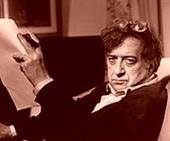I've noticed that a couple of people who have left comments seem to think this page is run by Gerhard. R. Koch, the guy who wrote article below. Just to set the record straight, Mr Koch has nothing to do with this page. I just stole his article from the Universal Editions' web page. (I doubt they'll mind. ) Actually, I have no idea who Gerald Koch is or if he's alive, dead or somewhere in between. So, just to reiterate, I am not Gerhard R. Koch...unless, that is, the police come asking question about me, in which case, yes, I am Gerhard R. Koch. You've got the wrong man, officer...
On the Death of Luciano Berio (Taken from Universal Editions' web page, as is the 'timeline' )
If one were to select a metaphor to describe the various tendencies and genres of the modern era, it would have to be that of the labyrinth – a concept which has occupied artists since the late Renaissance. The labyrinth is not just the classic garden maze, but also an inner, kaleidoscopic mobile, created by the subject and lying beyond the supposed security of the two-dimensional. And if one wanted to typify the most significant artists of the 20 th century, one could speak of the labyrinthine and the non-labyrinthine. The Italian composer Luciano Berio was both: a Mediterranean rationalist, even a pragmatic, and a restless searcher in the chaotic trenches of history. Born in 1924 in Oneglia near Genoa, he was always thought of as a sort of aesthetic and political antipode to Luigi Nono. Berio, though also left-of-centre politically, favoured the westward-looking orientation of his fellow Genoese Columbus. It was no coincidence that Berio spent much time living and learning in America. A dogmatist he was not. At the same time, the name Berio stands for new music’s heroic pioneering generation. He figured decisively in the genesis of many influential ideas and techniques – enthusiastic, unbelievably creative and versatile, but never convinced of having found the “silver bullet.†He did, of course, do serial composition in the 1950s, developing complex structures, but soon relaxed to produce prototypes of orchestral “music in space†with “Allelujah II.â€, while also taking John Cage’s idea of mobile forms and developing it further in a highly individual way (“Circlesâ€, “Tempi concertatiâ€). And he was one of the first to make creative use of music’s electro-acoustic dimension and – using the voice, of all things – to draw from it electronic masterpieces, such as “Omagio a Joyce†or “Altra voce.â€
Berio, of broad training and interests, was always on a two-fold search: for a musical language and for linguistic music. He was fascinated by literature in all its forms – less so as a vehicle of semantic communication than as a puzzle. For Berio, technical experimentation and expressive will often went hand-in-hand – right up to the significant ambiguity of the title “Laborintus.â€
Berio was constantly engaged in an intense dialogue with tradition. He even managed to create an oeuvre considered popular by some, even if certain characteristics of hermetic construction were indeed visible: the “Sinfonia†of 1968 – the dedication of this work to Leonard Bernstein was hardly a coincidence – presented in its third movement a “scherzo to end all scherzosâ€, music about music: superimposed upon the entirely through-composed “Sermon to the Fishes†scherzo from Mahler’s Second runs a dense collage of quotations from Bach to Berio. The work was an enormous success, but also earned Berio the accusation of having “betrayed†the “true†avant-garde.
Berio’s love of language, of communication and puzzles, naturally also pushed him towards the theatre, where he assumed a sovereign position in the middle – in the best sense of the word – where opera was to a large extent transformed into experimental music theatre: into a quasi-three-dimensional labyrinth of language, music and imagery. Whether scrambling up Verdi’s “Troubadour†in “La vera storia†or transforming Shakespeare’s Prospero from the “Tempest†into a timidly doubting, powerless theatre boss together with Italo Calvino in “Un re in ascoltoâ€, Berio – his aesthetic will highly developed – always took as his theme the incomprehensibility of the world and of life. Berio’s greatness consisted not least in his quest for reconciliation between the utopian future and the forces of tradition from which he still profited – thereby insisting on the unresolved, irresolvable tension between yesterday and tomorrow. In this, too, he had something in common with Odysseus who, in order to return home, had to travel ever further.
On 27 May, Luciano Berio died in Rome at the age of 77.
Gerhard. R. Koch
